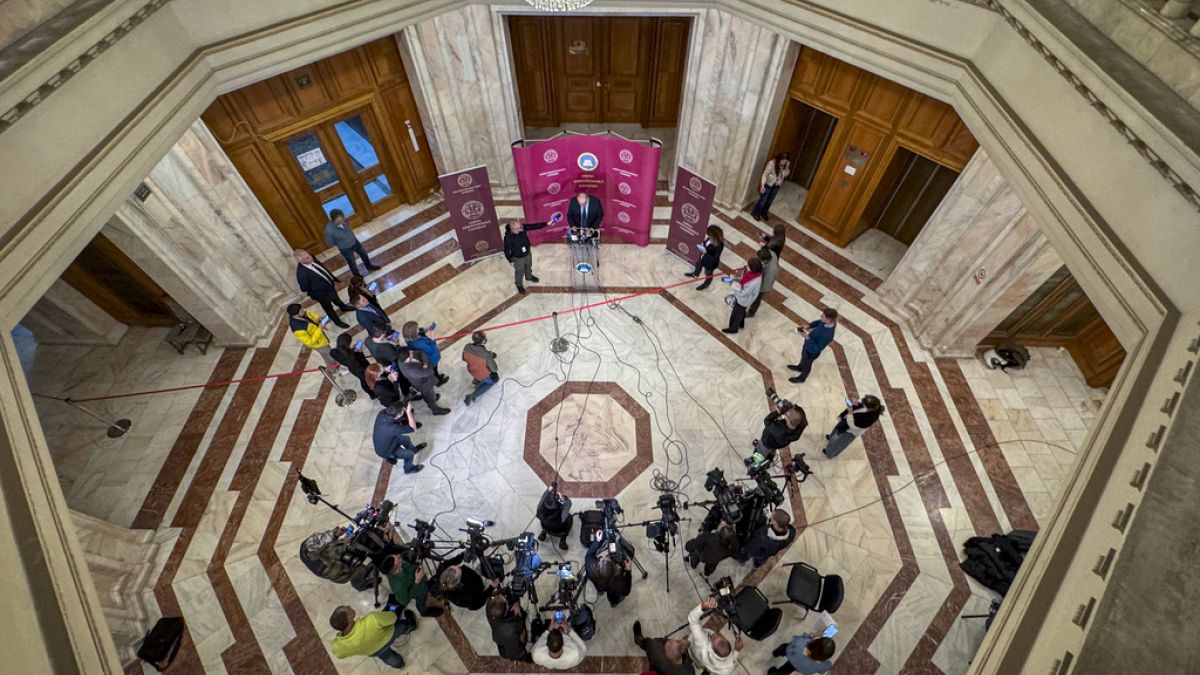Romanian Constitutional court decision seen as unusual, unprecedented

Urgency over alleged interference by the Russian Federation pushed Romanian judges to skip procedures and bypass transparency to save Romanian democracy, say experts.
The decision by Romania’s constitutional court’s to annul presidential elections was unusual and unprecedented, two experts have told Euronews in relation last week’s decision.
The Constitutional Court cancelled the election on Friday after a trove of declassified intelligence alleged Russia organised a sprawling campaign across social media to promote Georgescu.
The constitutional judges performed a volte face on the issue. On 5 December, the court announced that it would consider annulment of the first round of the presidential elections on 8 December, the day after the second round was due to take place. But a day later the court decided to cancel that second round vote.
Ioan Stanomir, a constitutional expert and professor at the University of Bucharest, said that it was never a good idea to plan on a decision after the second round. “If the winner was Georgescu, it would have meant basically trespassing on the right to vote enjoyed by all the Romanians,” according to Stanomir.
It is also “rather unusual” for a court to cancel elections without acting on any kind of official complaint, according to Stanomir.
The constitutional court acted ex officio in this case and although complaints had been filed with it by NGOs, no state bodies lodged complaints with the court.
Stanomir said the Constitutional court is the only body in Romania able to oversee and cancel a presidential election, and its verdict on such issues is final.
“That sounds like a very bold interpretation of (the Court’s) powers; it’s entirely new,” Jan Wouters, a professor of EU policy from the Catholic University of Leuven, said of the court’s ex-officio decision to annul the election.
Wouters said that in many countries decisions on election probity would be taken by an electoral commission, and that although such an authority does exist, its powers are more limited to issues of procedure, logistics and organisation of the elections, “so, I have never seen something of this of this kind”.
Stanomir said that the court took the decision in good faith and in defence of democracy, but he added: “In my modest view, the worst enemy of the Constitutional Court is its own lack of legitimacy and credibility in the eyes of many Romanians.”
Transparency and accountability of judicial system and of constitutional court
“The Constitutional court is packed with political appointees,” according to Stanomir, who said that the legitimacy of such decisions is would be enhanced by the court’s independence.
“When you are acting as if you have a political master, the degree of legitimacy is decreasing and any decrease in legitimacy is preventing you from being the guardian of the Constitution as you should be,” he said, adding that in this case the weakness of the judiciary system undermines the legitimacy of its actions.
The court cited the illegal use of digital technologies including artificial intelligence, as well as undeclared sources of funding. Without naming Georgescu, the court said one candidate received “preferential treatment” on social media platforms, distorting voters’ expressed will.
If the court steps in two days before the end of the electoral process – while votes are still being cast abroad by the Romanian diaspora – “you have to be crystal clear about the reasons,” he said.
For this reason Stanomir said the judges should have more explicitly set out the nature of the suspicion of foreign interference by Russia.
“We don’t know to what extent the information shared with the court was really of a magnitude that justified the annulment of the elections. They didn’t give any details about what was disclosed in those documents. They just spoke in those abstract terms,” he said, adding that “in the heat of the moment, they neglected to be very clear, very straightforward and very precise and very convincing”.








